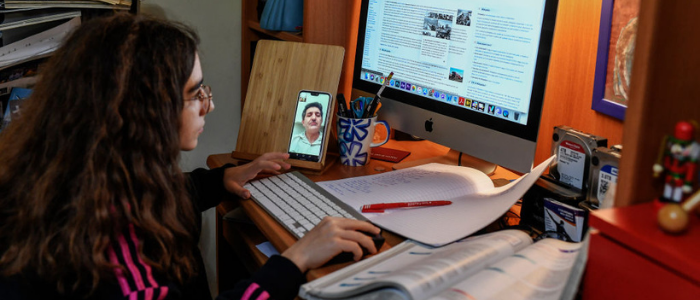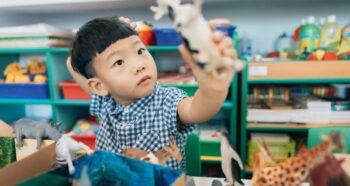Everything, different
Back in 2019 when I embarked on my journey to undertake a PhD in psychology and education at the University of Cambridge, I set out to research the complex relationship between children’s psychological wellbeing and their academic attainment. Then the Covid-19 pandemic hit and magnified this relationship in ways I could never have imagined. Young people’s – no, all people’s – mental wellbeing was truly tested. The uncertainty around the future, lack of in-person connection with others and concern for the health of loved ones and ourselves, were just some of the challenges we faced.
At the same time, schools, places ordinarily poised to counterbalance young people’s negative wellbeing, took on a different form for millions of learners worldwide.
The bustling atmosphere of classrooms, now replaced by frenetic chatrooms accompanying online lessons (for the lucky ones); the warmth of a favourite teacher, now mediated through electromagnetic waves; incidental chatter with schoolfriends, now muted and dependent on a stable internet connection: everything, at a distance; everything, different.
Covid-19: a magnifying glass
The learning ‘losses’ young people have experienced as a result of Covid-19 have been well-documented internationally. But this certainly wasn’t the only kind of ‘loss’ young people experienced. Many of the young people I supported through the earliest days of Covid-19 would have done anything to be able to return to school. Their wellbeing was suffering without school, and all the rich nutriments it provided them. It made me question what a world without school is for children whose world is school.
Feeling and functioning well
Researchers I work alongside in the field of psychology define children’s wellbeing as a subjective state of being including how a child feels (their ‘hedonic’ wellbeing) and how they function (their ‘eudaimonic’ wellbeing). Hedonic wellbeing is about a child’s happiness, sadness and overall satisfaction with life, whereas eudaimonic wellbeing pertains to how they think about their competence and potential (also referred to as self-actualisation).
I have written on the positive link between children’s wellbeing and their academic attainment. It is a complex relationship, but something researchers almost unanimously agree on is that children’s emotions, thoughts and behaviours (including educational outcomes) are linked. Carol Dweck’s Theory of Self and research underpinning it helpfully explains these links.
Is the purpose of education having a sense of purpose?
So, if children’s wellbeing and learning are linked, and both have been simultaneously impacted by the pandemic, the situation we find ourselves in begs the age-old question: what is the purpose of education? This question was, for many young people due to sit high-stakes exams in June 2020, entangled with their sense of self-worth. Would their hard work and years of dedicated study still count for something?
To understand what was going on for these learners, we can turn again to psychological theories of wellbeing. Self-Determination Theory (SDT) and decades of supporting evidence suggests three innate human needs require fulfilment in order for individuals to thrive and experience positive wellbeing. These are: feeling connected with others, competent and autonomous. The most striking being – at least in relation to learners’ experiences globally during 2020 – yep, you guessed it, the need to feel competent.
School can be a need-facilitating environment through which learners derive much self-competence. Whether this sense of competence is derived through being appointed captain of the school football team, awarded best dancer in the annual show, or having their care for others recognised, school can provide young people with a sense of purpose. But clearly exams – and their performance in them – are a key source of competence for many learners whose wellbeing is sustained through their ongoing study towards them. Research suggests such prolonged hard work can result in higher eudaimonic wellbeing.
What can schools do to support learner wellbeing?
Schools vicariously absorb much of the responsibility for children’s wellbeing. This has never been clearer than now, looking at education through the magnifying glass of the Covid-19 pandemic. But what can schools do to nurture learners’ wellbeing as the world returns to ‘normal’? Whatever ‘normal’ is anymore… In the Education Brief I recently authored for Cambridge Assessment International Education on Learner Wellbeing, I provide an introduction to this important topic and offer some practical tips. Hopefully this serves as a useful starting point for teachers and school leaders alike and underlines the positive impact school can have on learners beyond attainment alone.
If there’s one thing this pandemic has taught us, it’s that schools have a gargantuan role to play in children’s lives beyond their academic needs.
Further reading
Clarke, T. (2020). Children’s wellbeing and their academic achievement: The dangerous discourse of ‘trade-offs’ in education. Theory and Research in Education, 1477878520980197. https://doi.org/10.1177/1477878520980197
Csikszentmihalyi, M., & Hunter, J. (2003). Happiness in everyday life: The uses of experience sampling. Journal of Happiness Studies, 4, 185–199. https://doi.org/10.1023/A:1024409732742
Deci, E., L., & Ryan, R., M. (2000). The” what” and” why” of goal pursuits: Human needs and the self-determination of behavior. Psychological Inquiry, 11(4), 227–268.
Dweck, C. (1999). Self-theories: Their role in motivation, personality, and development. Psychology Press.
Ryan, R. M., & Deci, E. L. (2000). Self-determination theory and the facilitation of intrinsic motivation, social development, and well-being. American Psychologist, 55(1), 68.





